Papers by Tania El Khoury

Performance Research, 2015
Engage in a playful, theatre-inspired dialogue (complete with stage directions) in which they dis... more Engage in a playful, theatre-inspired dialogue (complete with stage directions) in which they discuss their complicated relationships, as live artists, working within theatre institutions. Chatting over Skype, Tania and Deborah discuss the ways in which work is read differently depending on the context within which it appears, and the difficulties from both the artist's and institution's perspective in offering appropriate financial compensation to artists for their work (particularly one-on-one performances). They discuss the nature of a theatre audience experiencing live art. Making specific references to some of their own works including Gardens Speak, Maybe if You Choreograph Me You Will Feel Better, The Future Show and The Advice Booth, El Khoury and Pearson situate themselves as live artists who work in the theatre institutions, and attempt to unpick and challenge the complexities that arise from that situation.
Performance Research, 2013
Performing Ethos: International Journal of Ethics in Theatre & Performance, 2012
Performance Research, 2016
Theater
Live artist Tania el Khoury reflects on the impact borders have had on her art practice since 200... more Live artist Tania el Khoury reflects on the impact borders have had on her art practice since 2005. She references her own As Far as My Fingertips Take Me (2016, with Basel Zaraa) and Nothing to Declare (2013, with Dictaphone Group) and examines in greater depth her work Cultural Exchange Rate, which was presented at the Fisher Center at Bard’s 2019 lab Biennial, Where No Wall Remains. El Khoury was a cocurator of the biennial and offers additional reflections on that process, which was her first experience curating an arts festival.
Performance Research, 2016
This article narrates and analyses three instances of swimming in the Beirut sea as political per... more This article narrates and analyses three instances of swimming in the Beirut sea as political performances. Since the end of the Lebanese Civil War in 1990, researchers, media outlets and community activists have highlighted the accelerating privatization of the Lebanese coast. This article is written as three separate scenes based on real-life activities that have taken place on the Beirut coast over the past three years (2012–15). In doing so, it highlights the structures of power as well as the actions of resistance by focusing on swimming as a political performance and the Mediterranean as a death trap.
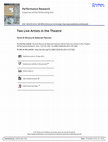
Engage in a playful, theatre-inspired dialogue (complete with stage directions) in which they dis... more Engage in a playful, theatre-inspired dialogue (complete with stage directions) in which they discuss their complicated relationships, as live artists, working within theatre institutions. Chatting over Skype, Tania and Deborah discuss the ways in which work is read differently depending on the context within which it appears, and the difficulties from both the artist's and institution's perspective in offering appropriate financial compensation to artists for their work (particularly one-on-one performances). They discuss the nature of a theatre audience experiencing live art. Making specific references to some of their own works including Gardens Speak, Maybe if You Choreograph Me You Will Feel Better, The Future Show and The Advice Booth, El Khoury and Pearson situate themselves as live artists who work in the theatre institutions, and attempt to unpick and challenge the complexities that arise from that situation.
Books by Tania El Khoury

Across Syria, many gardens conceal the dead bodies of activists and protestors who adorned the st... more Across Syria, many gardens conceal the dead bodies of activists and protestors who adorned the streets during the early periods of the uprising. These domestic burials play out a continuing collaboration between the living and the dead. The dead protect the living by not exposing them to further danger at the hands of the regime. The living protect the dead by conserving their identities, telling their stories, and not allowing their deaths to become instruments of the regime.
Gardens Speak is an interactive sound installation that toured around the world. It contains the oral histories of ten ordinary people who were buried in Syrian gardens. Each narrative has been carefully constructed with the friends and family members of the deceased to retell their stories as they themselves would have recounted it. This book contains the narrative text of those ten oral histories in both English and spoken Arabic. It includes an acknowledgement and introduction by the artist, and illustrations of the audience experience in Gardens Speak.
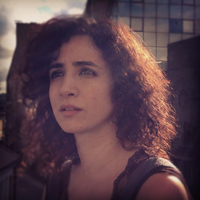
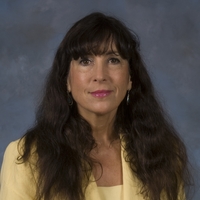

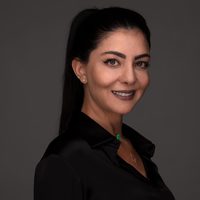

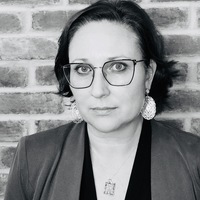

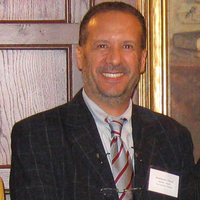

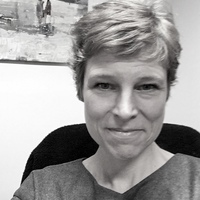
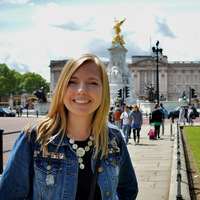
Uploads
Papers by Tania El Khoury
Books by Tania El Khoury
Gardens Speak is an interactive sound installation that toured around the world. It contains the oral histories of ten ordinary people who were buried in Syrian gardens. Each narrative has been carefully constructed with the friends and family members of the deceased to retell their stories as they themselves would have recounted it. This book contains the narrative text of those ten oral histories in both English and spoken Arabic. It includes an acknowledgement and introduction by the artist, and illustrations of the audience experience in Gardens Speak.
Gardens Speak is an interactive sound installation that toured around the world. It contains the oral histories of ten ordinary people who were buried in Syrian gardens. Each narrative has been carefully constructed with the friends and family members of the deceased to retell their stories as they themselves would have recounted it. This book contains the narrative text of those ten oral histories in both English and spoken Arabic. It includes an acknowledgement and introduction by the artist, and illustrations of the audience experience in Gardens Speak.